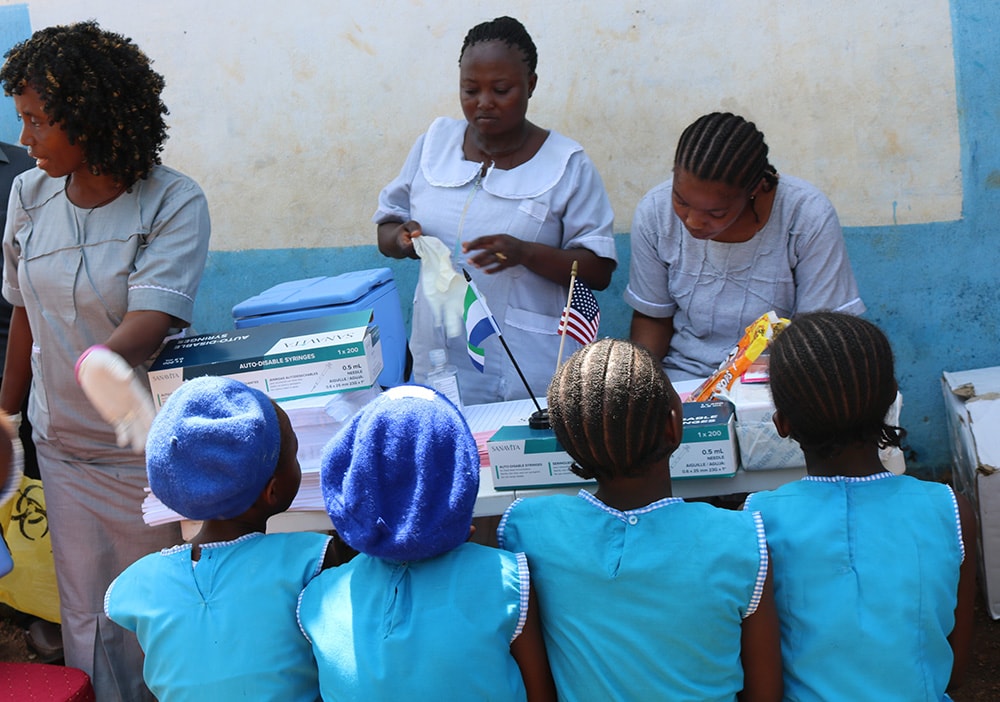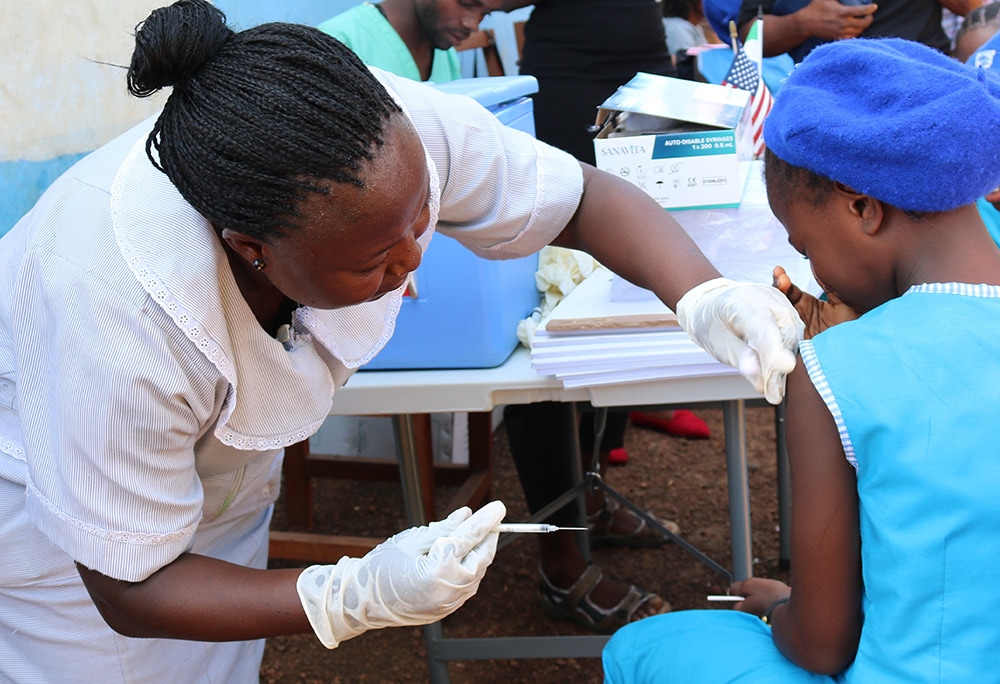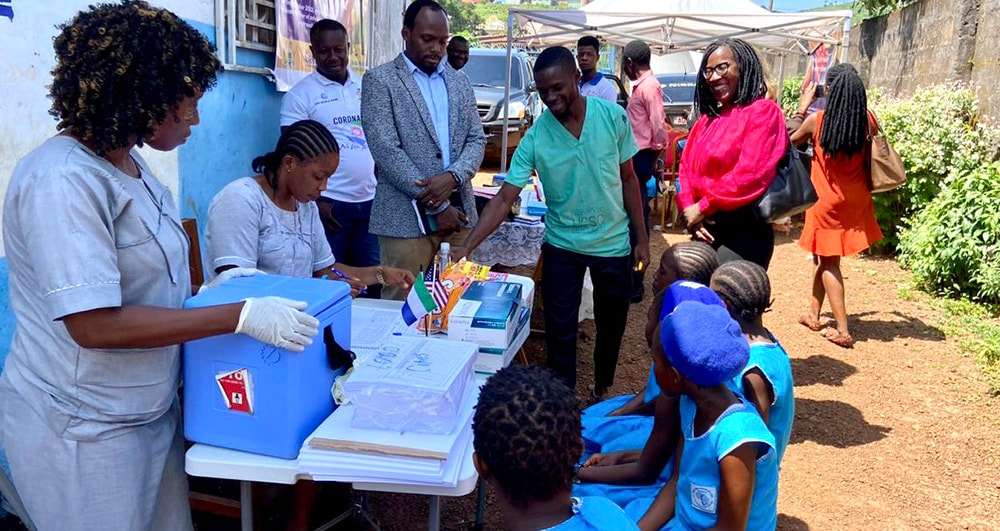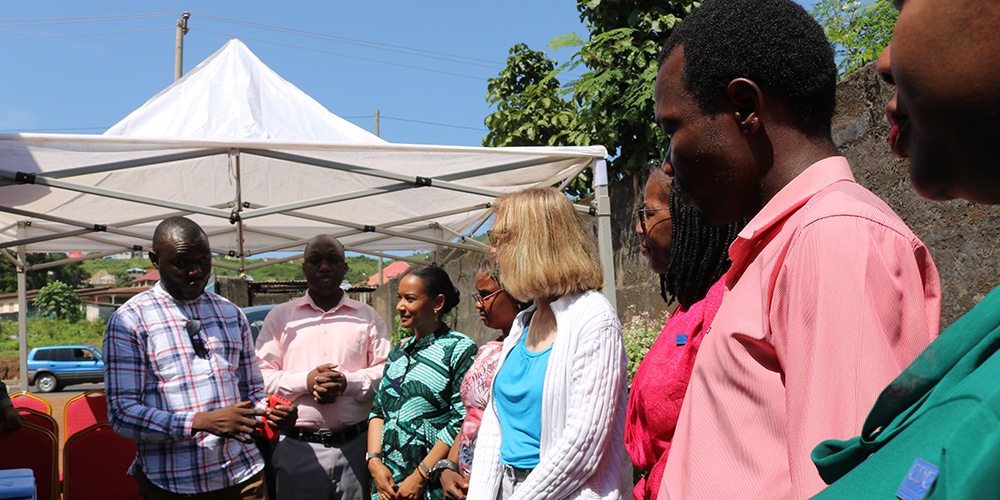Protecting Girls in Sierra Leone from COVID-19 and Cervical Cancer Through Joint Vaccination Events
Summary
- With U.S. CDC support, health officials in Sierra Leone launched a vaccination campaign to bring COVID-19 and human papillomavirus (HPV) vaccines to eligible students in thousands of schools across the country.
- Girls and boys aged 12 years and older could get the COVID-19 vaccine and ten-year old girls could get the HPV shots during this vaccine campaign.
- Strong planning, partnerships, and health officials providing trustworthy information to parents and students helped the campaign exceed its goals and become a model for integrating HPV and COVID-19 vaccinations.
- At the end of Sierra Leone’s unique 5-day vaccination campaign, 178,000 girls got the HPV vaccine, and more than 400,000 teens were vaccinated against COVID-19.
Since the first COVID-19 vaccines arrived in Sierra Leone in March 2021, the United States, in partnership with the Government of Sierra Leone, has worked to prevent COVID-19 infections. Throughout the pandemic, the U.S. Centers for Disease Control and Prevention (U.S. CDC), and the U.S. Agency for International Development (USAID) assisted Sierra Leone with the rollout of lifesaving COVID-19 vaccines.
The U.S. government donated more COVID-19 vaccines to Sierra Leone than any other country, totaling over 1.6 million vaccine doses received.
Extensive planning, training, data management, and monitoring of current vaccination efforts began at the start of the pandemic. As COVID-19 vaccines were developed and tested, U.S. CDC provided technical assistance to plan and monitor COVID-19 vaccination campaigns.
In addition to the U.S. CDC, the World Health Organization (WHO), United Nations International Children’s Emergency Fund (UNICEF), ICAP at Columbia University, the Clinton Health Access Initiative, and The Task Force for Global Health were already working on vaccination programs in this country.

Four students at the Forum for African Women Educationalists Girls Junior Secondary School in Waterloo wait to get an HPV vaccine or COVID-19 vaccine, depending on their age. The U.S. CDC supported Sierra Leone’s dual vaccination campaign in October 2022. Photo by Phillip Turay/U.S. Embassy Sierra Leone.
By 2022, all these groups coordinated their COVID-19 vaccination efforts to create the One Country Plan, an initiative to streamline the national COVID-19 vaccination work and get as many people in Sierra Leone vaccinated as possible.
The main goal was to get COVID-19 vaccines to people who were not vaccinated. U.S. CDC’s technical support was designed to help Sierra Leone meet the WHO’s ambitious target to vaccinate 70% of the eligible population against COVID-19.
Expanding COVID-19 Vaccination Events to Protect Young Women from Deadly Cancer
COVID-19 vaccination efforts overlapped with the introduction of another vaccine that can prevent future illness. In October 2022, after months of planning, the Government of Sierra Leone added the human papillomavirus (HPV) vaccine to the routine immunization schedule.
The U.S. CDC team based in Sierra Leone provided technical guidance on the rollout of the HPV vaccine, which prevents cervical cancer ─ the second most common cancer among women in and the number one cancer killer among women between the ages of 14 and 44 in Sierra Leone.
The introduction of HPV vaccine is one of the government’s key strategies towards eliminating cervical cancer in the country.
Sierra Leone set a goal of getting nearly 154,000 10-year-old girls vaccinated against HPV. The government wants to vaccinate girls long before they are potentially exposed to cancer-causing infections.
Introducing the Five-Day Vaccine Integration Campaign
The decision was made to introduce the HPV vaccine at routine COVID-19 vaccination clinics.
A five-day campaign was launched on October 3, 2022.
The COVID-19/HPV vaccination campaign aimed to vaccinate all eligible children and young adults. The vaccination efforts were so successful, that more individuals than expected took advantage of the opportunity. By the end of the campaign 178,062 10-year old girls (117% of the goal) were vaccinated against HPV, and 414,305 individuals aged 12-years and older (70%) received the COVID-19 vaccine across 16 districts.
After the success of this vaccination campaign, COVID-19 vaccines were offered once or twice a month. These vaccination campaigns led Sierra Leone to reach their goal of vaccinating 70% of the eligible population by the end of December 2022. Since then, Sierra Leone has vaccinated even more people against COVID-19 and exceeded the global goal set by WHO.

A health worker at a vaccination clinic offering COVID-19 protection and cancer-preventing HPV vaccines, prepares to give this student a shot.
Photo by Phillip Turay/U.S. Embassy Sierra Leone.
The campaign to introduce the HPV vaccine was also a success, and these vaccines are now offered on a routine basis with the other childhood vaccines.
Strong Planning and Partnerships Produced Strong Results
The success of the CDC-supported vaccine integration campaign was largely due to coordination, efficient planning, and collaboration and communication by the government education and health ministries, local leaders, and community influencers (Paramount Chiefs, opinion leaders, religious leaders). This gave each community ownership and contributed to the success of vaccination efforts.
With U.S. CDC support and technical advice, health officials had tools to increase the number of people who were vaccinated by countering misinformation related to vaccines and explaining how they help protect people and prevent illnesses.
As of January 1, 2023, more than 74% of all individuals aged 12 and older in Sierra Leone were fully vaccinated against COVID-19. The growing vaccination coverage in the country is an example of how this partnership produces meaningful results.

Chinyere Ekechi, a deputy country director in U.S. CDC’s Sierra Leone office (in pink shirt) joins local health officials at a school where health workers are giving students either a COVID-19 or HPV vaccine at the Forum for African Women Educationalists Girls Junior Secondary School in Waterloo, Sierra Leone. Photo by Phillip Turay/U.S. Embassy Sierra Leone.
At a press briefing to mark the achievement of 70% COVID-19 vaccination coverage, the Minister of Health and Sanitation, Dr. Austin Demby, expressed his gratitude for support provided by the U.S. CDC and partners in the COVID-19 vaccine rollout and HPV vaccine introduction. He said, ”this successful activity highlights the impact of effective management and collaboration in overcoming challenges and achieving significant progress in public health initiatives for Sierra Leone.”

Health officials visit a combined COVID-19 and HPV vaccine event held at Forum for African Women Educationalists Girls Junior Secondary School in Waterloo, Sierra Leone. Participants from Left to Right are: Haurace Nyandemoh, Ronald Mutebi (ICAP), Monique Foster CDC-Sierra Leone Deputy Program Director Ramatu Monica Turay, Teresa Durden, CDC-Sierra Leone Deputy Country Director Chinyere Ekechi, John K. Amara, and Rugiatu Kamara. Photo by Phillip Turay/U.S Embassy Sierra Leone.
COVID-19 vaccines are effective at protecting people from getting seriously ill, being hospitalized, and dying. Getting children vaccinated against HPV is the best way to protect them against certain types of cancer later in life. This combined vaccination campaign provides a powerful defense against both COVID-19 and cervical cancer.
The success of Sierra Leone’s unique approach to rolling out the HPV and COVID-19 vaccines at the same time and then integrating them into the routine immunization system is one which may be modeled in other countries.